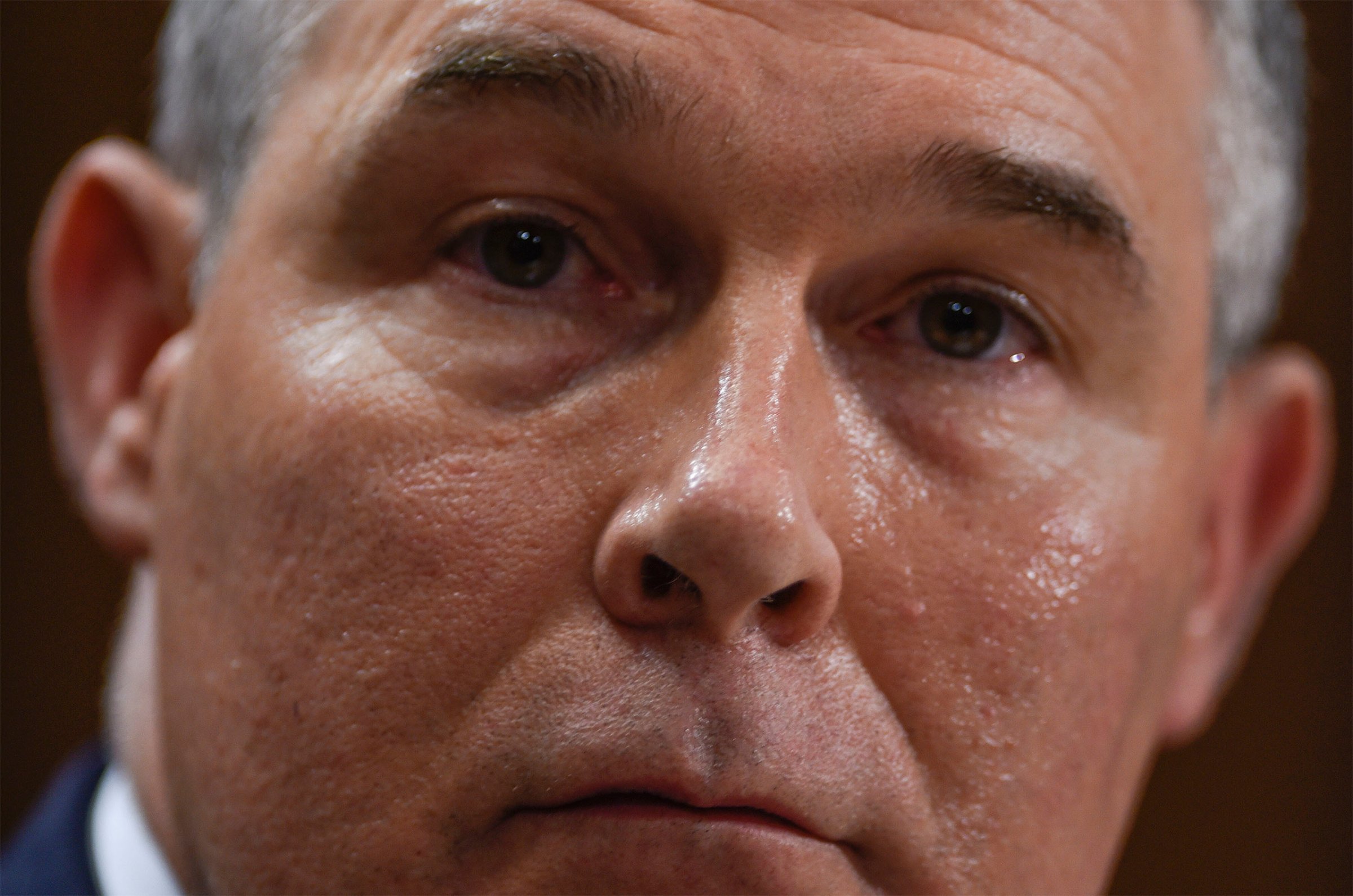
President Donald Trump said recently the tradition of rating a new president’s first 100 days is “ridiculous.” The White House then created a website devoted to rating his first 100 days. It’s further proof that the defining feature of this presidency is noise.
The Administration sounds some piercing new alarm every day, making it hard to separate the momentarily disturbing from the truly damaging. But this is essential — especially for the environment. While Trump has flip-flopped on some of his signature issues, he has been totally consistent about protections for public health, clean air and clean water: He wants to dismantle them.
So, let’s take a closer look at what he’s done this far, and what it will mean for our health and our world.
1. Hired Scott Pruitt
Trump’s choice to lead the Environmental Protection Agency built his career by attacking the agency and its clean air and water rules. Pruitt is beginning to staff the EPA with Beltway insiders who have made their living lobbying for weaker pollution rules on behalf of the industry. For example, it has been widely reported that Andrew Wheeler may be named Pruitt’s top deputy. Wheeler is now a lobbyist for Murray Energy, a coal-mining conglomerate that is demanding an end to the rule that limits mercury pollution.
In fact, a recent analysis by Columbia University Law School showed that more than one quarter of the Administration’s appointees so far to environmental, energy, and natural resource management agencies have close ties to the fossil-fuel industry. The likely result: Thousands of decisions over the next four years made by those more interested in protecting polluters than public health. That will leave a toxic legacy of more disease and premature death.
2. Undermined chemical safety
Last year, a Congress overwhelmingly passed the bipartisan Lautenberg Act, a new chemical safety law that, after four decades of a broken system flooding our stores and homes with dangerous or untested chemicals, finally constructed a strong chemical safety net.
But now the EPA has to finish writing the rules to implement it. For that, Pruitt has chosen Nancy Beck, an insider straight from the main chemical industry trade association who has even within the last few weeks lobbied the agency on these very rules. If the new rules give the industry everything it wants, we’ll have blown a historic chance to restore public trust and market confidence in the products consumers buy for household use, everything from paints to baby clothes to cleaning products. Our health and that of our environment would continue to be at risk — and undoing the damage would take years.
3. Slashed the federal budget
The Administration’s budget proposal would cut the EPA by almost a third — more than any other agency, even though its budget is tiny. Out of every $10 the federal government spends, only two cents go to the EPA. These cuts don’t really save money. They’re part an ideological crusade that the public doesn’t support.
If the EPA budget is cut this way, the loss of experts and institutional knowledge will reverberate for years. Detailed plans obtained by the Washington Post show that Trump and Pruitt want to cut a quarter of the workforce and abolish 56 programs with impacts from the Chesapeake Bay to Puget Sound. Such reductions would cripple the agency’s ability to protect clean air and water. Together, this will lead to more asthma attacks, more health problems for the elderly and a more dangerous future.
4. Rolled back health protections from dirty energy
Pruitt is now trying to gut many of the same the rules and safeguards he sued to stop as Oklahoma’s attorney general. They limit the amount of arsenic and acid gases power plants can emit, reduce smog that causes respiratory problems and cut carbon pollution that causes climate change.
He has signaled hostility to the Mercury and Air Toxics Rule, despite the fact that nearly all power plants are in compliance. The EPA chief and Trump are also planning to withdraw the Clean Power Plan, America’s first limits on carbon pollution from power plants, without any strategy for how to replace it.
And Trump and Pruitt are risking all this for the sake of putting the American energy industry farther behind: The energy market is moving toward cleaner energy, but slowing that process means losing clean tech jobs to other countries and a bigger cleanup for our children’s generation.
And yet he has also: Fueled environmental activism
This fifth item is the positive legacy of the Trump Administration: Americans who used to take clean air and water for granted are waking up to the danger. Membership in environmental groups is skyrocketing — the biggest question we get these days is, “What can I do?” — as women and men from all walks of life reclaim environmentalism as a mainstream American value. On Saturday, thousands will take to the streets in Washington, D.C., and other cities for the People’s Climate March.
Just as a blossoming environmental awareness in the early 1970s led to some of the bedrock laws we rely on today, I believe the great awakening of 2017 will echo for years to come. If we work together and make our voices heard, we can limit the worst of the damage Trump intends to inflict.
More Must-Reads from TIME
- Why Trump’s Message Worked on Latino Men
- What Trump’s Win Could Mean for Housing
- The 100 Must-Read Books of 2024
- Sleep Doctors Share the 1 Tip That’s Changed Their Lives
- Column: Let’s Bring Back Romance
- What It’s Like to Have Long COVID As a Kid
- FX’s Say Nothing Is the Must-Watch Political Thriller of 2024
- Merle Bombardieri Is Helping People Make the Baby Decision
Contact us at letters@time.com